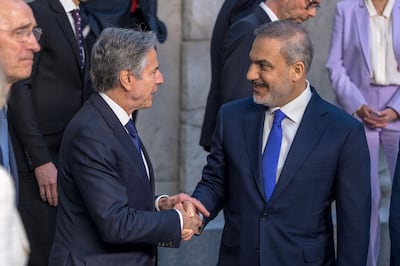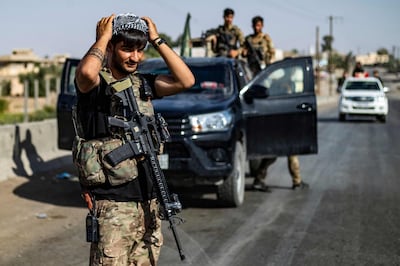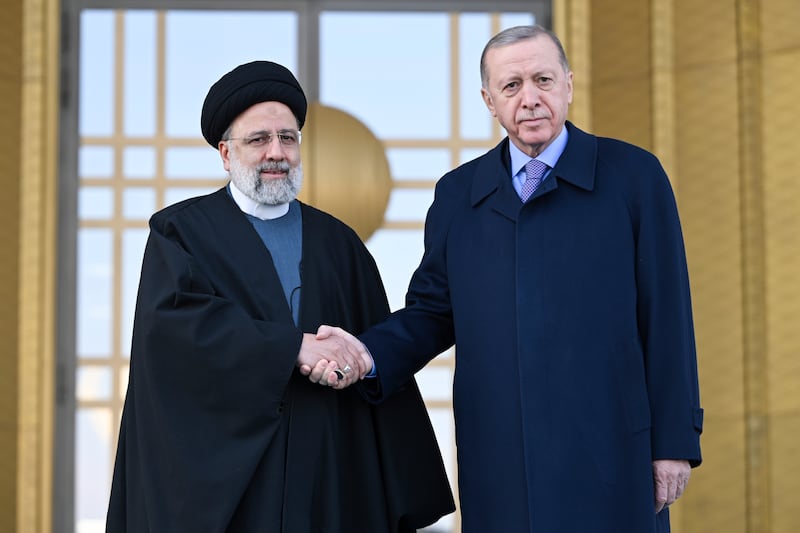Live updates: Follow the latest on Israel-Gaza
Turkey has tried to position itself as a mediator in global conflicts for years, shuffling between warring parties including Russia and Ukraine.
It is currently restructuring its Foreign Ministry to include a department specifically dealing with international negotiations.
In the Israeli-Palestinian conflict, its success so far has been limited. Israel has lost trust in Ankara due to Turkish President Recep Tayyip Erdogan’s overt criticism of Prime Minister Benjamin Netanyahu’s conduct, and the country's hosting of Hamas officials.
Ankara, meanwhile, has been angered by the widespread killing of Palestinian civilians.
Qatar and Egypt, rather than Turkey, emerged as the main regional negotiators in a Gaza ceasefire and hostage release deal late last year.
But after Iran’s April 13 attack on Israel, Turkey has been among the key back channels between Tehran and Israel’s western allies as diplomats seek to stop tension spilling into a regional conflict.
Turkish officials are among the few who speak directly to the US, Israel, Hamas members and Iran.
“It is a smart move and humanitarian responsibility to take any initiative, including Turkey's mediation, for a ceasefire and solution” a senior Turkish official told The National.
Turkish Foreign Minister Hakan Fidan spoke to his Iranian and US peers before and after Iran launched about 300 drones and missiles at Israel on Saturday night.
Tehran said the attack was in response to the bombing of the Iranian consulate compound in Damascus on April 1.
“The developments did not come as a surprise,” another Turkish diplomatic official said, referring to Iran’s attack.
Iran informed Turkey about the response options, the source said.
“Possible developments were also discussed during the call with [US Secretary of State Antony] Blinken," the official said.
"The American side conveyed to Iran through us that the reaction should remain within certain limits.
“In response, Iran said that the response would be a retaliation to the attack on the embassy in Damascus and would not go beyond that.”
In a phone call after the attack, Mr Fidan told Iranian Foreign Minister Hossein Amirabdollahian that Turkey does not want any further escalation.
Switzerland has also played a key role in messages between Iran and Washington.
Mr Erdogan criticised western nations for condemning Iran’s attack on Israel but not the strike on the consulate.
“Unfortunately, only a couple of countries responded negatively to this unfortunate event,” he said this week.
“So those who keep their silence against the violations by Israel started competing with each other in order to condemn Iran.”

Balancing act
Despite the anti-Israel launguage, Ankara is trying to tread a fine line between maintaining commercial and political links with Israel, managing domestic anger over the war in Gaza, and keeping up ties with Iran.
Turkey has banned some exports to Israel but maintains a diplomatic relationship with the country, and enables its oil trade with Azerbaijan.
Israel is Turkey’s 13th largest trade partner and Ankara can ill afford to halt billions of dollars in annual exports as the Turkish economy suffers high inflation and a rapid fall in the value of its currency.
“He [Erdogan] is trying to play on both sides of the ball,” a senior Israeli official told The National.
Trust between Israel and Turkey is at near-historic lows. Ankara is not included in a list of foreign nations that Israel is engaging with as it hopes to build momentum for further sanctions against Iran.
Ankara has more successfully engaged with Israel’s western allies. After Iran’s attack, the US acknowledged Turkey’s role in back-channelling messages to Iran.
“Secretary Blinken thanked Foreign Minister Fidan for his ongoing engagement to prevent further escalation in the region,” said a US State Department representative.
Mehmet Koc, an Ankara-based analyst who lived in Iran for 20 years, said: “Turkey has both Iran’s trust and the trust of the US and the West.
"And because of this, in this crisis between Israel and Iran, it has been able to act as an intermediary point.
“Iran values Turkey’s position towards the West, including America, and welcomes Turkey’s role as an intermediary between Iran and America.”
In playing a balancing act between Iran and Israel, and its western allies, Turkey appears to want to prove itself as a reliable interlocutor for the US and UK, which are also important trade and security partners.
Nato member Turkey and the US in particular have had strained relations in recent years over Washington’s backing of Syrian Kurdish forces that have close ties to the Kurdistan Workers’ Party (PKK), a group proscribed as a terrorist organisation and regarded as a national security threat by Turkey.

Global mediator
A presidential decree dated April 6, 2024, seen by The National, detailed a reform plan for the Turkish Ministry of Foreign Affairs.
It includes the creation of a “Directorate General for International Mediation', to be led by an ambassador-level official.
According to the document, the department is responsible for carrying out, “mediation, conflict prevention and crisis-management activities within international congresses and other projects within this scope.”
Turkey has real reasons to actively de-escalate tensions in the region.
More widespread conflict could lead to migration into the country, already host to millions of Syrian and Afghan refugees, and worsen economic conditions in key trade partner countries such as Iraq and Iran.
Turkey is also continuing to speak directly to Hamas. In Doha on Wednesday, Mr Fidan held a three-hour meeting with political leader Ismail Haniyeh.
The Palestinian group pledged to lay down its arms on the creation of a Palestinian state, the Turkish minister said.
“Hamas stated that after the establishment of an independent Palestinian state to be established on the basis of the 1967 borders, there would not be any armed wing and they will continue life as a political party,” Mr Fidan told media after the meeting.
“That is what Hamas stated. I think this is a very important statement from Hamas, so the whole world can undertake the necessary steps.”
There is a limit to Turkey’s willingness to play go-between, however.
Asked if he expected Ankara to continue conveying messages between Iran and the West, one of the Turkish officials said: “No. We expect the West to establish good relations with the countries in the region and avoid initiatives that would disrupt regional stability.”





